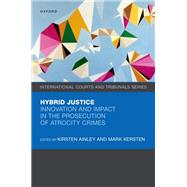
Hybrid Justice Innovation and Impact in the Prosecution of Atrocity Crimes
by Ainley, Kirsten; Kersten, Mark-

This Item Qualifies for Free Shipping!*
*Excludes marketplace orders.
Buy New
Rent Textbook
Rent Digital
Used Textbook
We're Sorry
Sold Out
How Marketplace Works:
- This item is offered by an independent seller and not shipped from our warehouse
- Item details like edition and cover design may differ from our description; see seller's comments before ordering.
- Sellers much confirm and ship within two business days; otherwise, the order will be cancelled and refunded.
- Marketplace purchases cannot be returned to eCampus.com. Contact the seller directly for inquiries; if no response within two days, contact customer service.
- Additional shipping costs apply to Marketplace purchases. Review shipping costs at checkout.
Summary
Hybrid Justice critically examines the resurgent promise of hybrid courts. Focusing on the fields, practices, innovations, and of hybrid courts, the contributors evaluate hybrids' success, and in doing so, help to clarify the conditions and mechanisms that makes hybrids likely to succeed in their mandates and impacts. The authors focus on hybrid courts and resilience: the resilience of hybrid mechanisms to withstand political and other pressures to deliver justice and accountability, and the potential contribution of hybrids to the resilience of affected communities.
Borne out of a collaboration between lawyers, academics, and activists, this edited volume provides a uniquely comparative account of the development of hybrid courts in recent years.
Author Biography
Kirsten Ainley is Professor of International Relations at the Australian National University and the Principal Investigator of the Hybrid Justice project. Her research focuses on international policy and practice in military, legal, and development-focused interventions, and the impacts of these interventions, with an increasing focus on their gendered impacts. She has published on international criminal law, transitional justice, and the International Criminal Court, and her current work traces funding streams for international courts and transitional justice programmes. She co-authored, with Mark Kersten, the Dakar Guidelines on the Establishment of Hybrid Courts, which develop good practice on setting up hybrid tribunals.
Mark Kersten is Assistant Professor in the Criminology and Criminal Justice Department at the University of the Fraser Valley in British Columbia, Canada, and a Senior Consultant at the Wayamo Foundation in Berlin, Germany. Mark is the founder of the blog Justice in Conflict and author of the book, published by Oxford University Press, by the same name. His research on the pursuit of justice and accountability for mass atrocities, peace processes and conflict resolution has appeared in numerous academic fora as well as media publications such as Al Jazeera, BBC, Foreign Policy, Toronto Star, and The Washington Post.
Table of Contents
An electronic version of this book is available through VitalSource.
This book is viewable on PC, Mac, iPhone, iPad, iPod Touch, and most smartphones.
By purchasing, you will be able to view this book online, as well as download it, for the chosen number of days.
Digital License
You are licensing a digital product for a set duration. Durations are set forth in the product description, with "Lifetime" typically meaning five (5) years of online access and permanent download to a supported device. All licenses are non-transferable.
More details can be found here.
A downloadable version of this book is available through the eCampus Reader or compatible Adobe readers.
Applications are available on iOS, Android, PC, Mac, and Windows Mobile platforms.
Please view the compatibility matrix prior to purchase.
